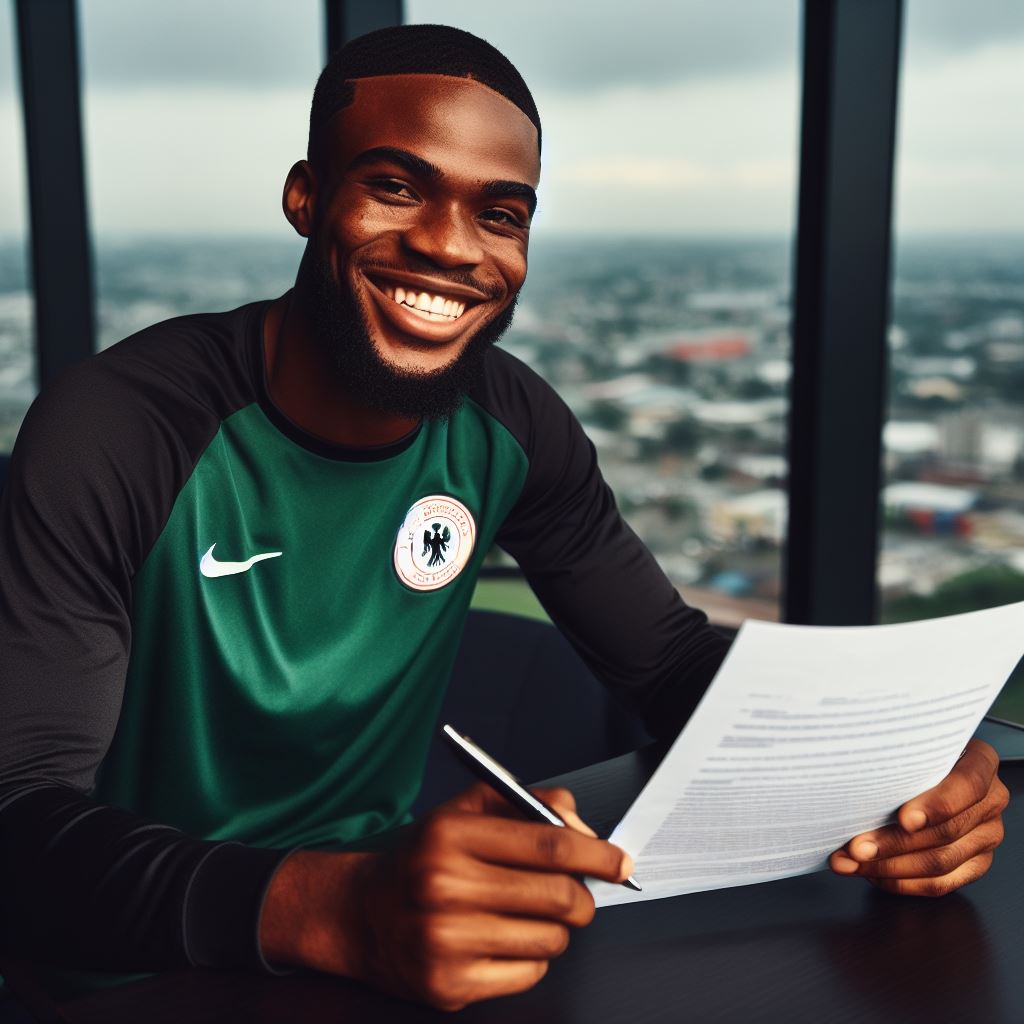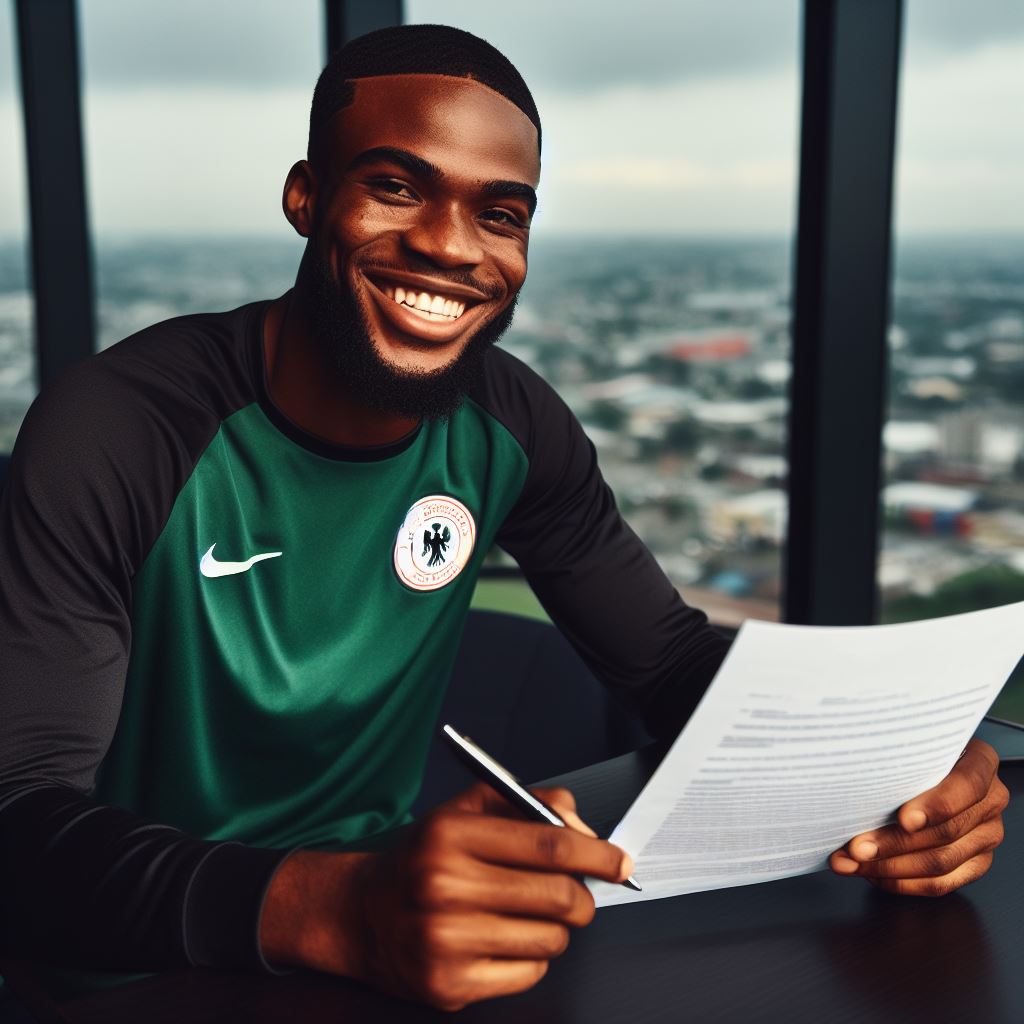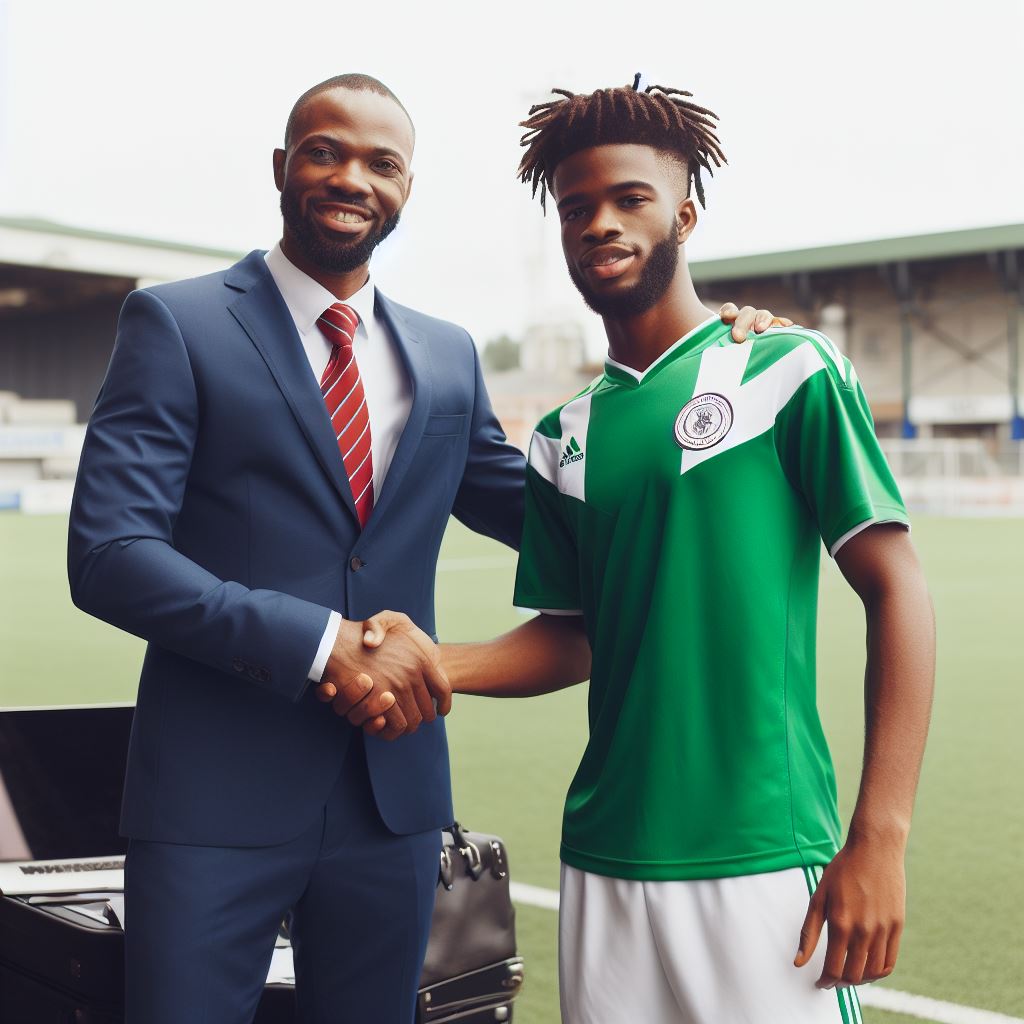Introduction
A sports agent plays a crucial role in the career management of athletes, negotiating contracts, endorsements, and sponsorships.
They act as representatives and advocates for their clients.
Legal requirements for sports agents in Nigeria are of utmost importance to regulate their activities, protect athletes’ rights, and maintain industry standards.
Agents must comply with these requirements to ensure transparency, fairness, and ethical practices.
This blog section aims to provide readers with a comprehensive understanding of the legal requirements for sports agents in Nigeria.
It will delve into the specific laws, regulations, and obligations that agents must abide by, as well as the consequences of non-compliance.
By exploring this topic, readers will gain insights into the legal framework that governs the sports agent profession in Nigeria.
It will equip athletes, aspiring agents, and industry stakeholders with knowledge to identify legitimate agents, ensure proper representation, and navigate the complexities of the sports business landscape.
Throughout the section, we will discuss key legal provisions, licensing requirements, and professional standards that sports agents must adhere to.
We will also examine the impact of these legal requirements on the development and growth of the sports industry in Nigeria.
Overall, this blog section aims to empower readers by shedding light on the legal requirements for sports agents in Nigeria, promoting accountability, and fostering a fair and transparent sports agent profession.
Overview of Sports Agent Industry in Nigeria
The sports industry in Nigeria has experienced significant growth and development in recent years.
This growth has led to an increase in the demand for sports agents who play a crucial role in athlete representation and contract negotiations.
Growth and Development of the Sports Industry in Nigeria
Nigeria has a rich sporting culture, and sports such as football, basketball, athletics, and boxing are particularly popular.
Over the years, there has been a steady growth in the professionalization of sports in the country.
The establishment of various sports leagues, academies, and training centers has contributed to the development of local talent and the improvement of sporting infrastructure.
This has also attracted international attention, with Nigerian athletes achieving success on the global stage.
Additionally, the increasing popularity of sports in Nigeria has led to the emergence of commercial opportunities in areas such as broadcasting rights, sponsorships, and merchandising.
This growth has created a need for sports agents to navigate the complex landscape of the sports industry.
Increase in Demand for Sports Agents
With the expansion of the sports industry, there has been a corresponding increase in the demand for sports agents in Nigeria.
Athletes require professional representation to enhance their chances of securing favorable contracts, endorsements, and other lucrative opportunities.
Sports agents act as intermediaries between athletes and various stakeholders, including clubs, sponsors, and brands.
They provide valuable guidance and expertise in negotiating contracts, managing financial matters, and protecting the interests of the athletes they represent.
Furthermore, the rise of social media and digital platforms has amplified the need for sports agents who can navigate the complexities of building an athlete’s brand and maximizing their commercial value.
Role of Sports Agents in Athlete Representation and Contract Negotiations
Sports agents play a crucial role in athlete representation and contract negotiations in Nigeria.
They serve as advocates for athletes, ensuring their interests are protected and that they receive fair treatment in contractual agreements.
These agents have a deep understanding of the industry, including the legal and financial aspects of athlete representation.
They negotiate the terms and conditions of contracts, including salaries, bonuses, image rights, and other incentives on behalf of their clients.
Sports agents also provide guidance to athletes on career development, retirement planning, and making the most of their sporting achievements.
They create opportunities for athletes to secure endorsements and sponsorships that align with their personal brand and values.
In short, sports agents play a vital role in the sports industry in Nigeria.
As the industry continues to grow, their expertise and services will be in high demand to ensure athletes receive fair treatment and maximize their potential on and off the field.
Read: Nigeria’s Top Sports Agents: Success Stories to Inspire
Legal requirements for sports agents in Nigeria
In order to operate as a sports agent in Nigeria, individuals must adhere to several legal requirements.
These requirements ensure that agents operate within the confines of the law and protect the interests of both athletes and the sport as a whole.
Below are the key legal requirements for sports agents in Nigeria:
Registration with the Nigeria Football Federation (NFF)
Sports agents must be registered with the NFF, a body responsible for governing football activities in Nigeria.
Registration involves submitting relevant documents and paying appropriate fees to the NFF.
By registering, agents become recognized by the NFF and are granted certain privileges and responsibilities.
Compliance with the NFF Agents Regulations
Agents must abide by the regulations set forth by the NFF specifically for sports agents.
These regulations outline the code of conduct, contractual obligations, and ethical standards agents must adhere to.
Failure to comply with these regulations may result in penalties or the revocation of an agent’s license.
Eligibility criteria for sports agents
Sports agents must satisfy certain eligibility criteria to operate legally.
These criteria may include having a minimum level of education, relevant experience, and good character.
By meeting these criteria, agents demonstrate their capacity to effectively represent athletes in Nigeria.
Licensing and renewal process
Agents must obtain a license from the NFF to legally practice as a sports agent in Nigeria.
The licensing process involves submitting an application, providing supporting documents, and undergoing background checks.
Licenses must be renewed periodically to ensure that agents stay up to date with evolving regulations and standards.
Fees and penalties
Agents are required to pay fees to the NFF for registration, licensing, and renewal.
The amount of these fees may vary depending on factors such as the agent’s experience and status.
Failure to pay the required fees or violating the NFF Agents Regulations may result in penalties or the suspension of an agent’s license.
In fact, sports agents in Nigeria are subject to various legal requirements to ensure their professionalism and protect the interests of athletes.
By registering with the NFF, complying with the NFF Agents Regulations, fulfilling eligibility criteria, obtaining and renewing licenses, and paying the necessary fees, agents can operate legally and effectively in the Nigerian sports industry.
Read: Becoming a Sports Agent in Nigeria: A Complete Guide
Responsibilities and Obligations of Sports Agents
Duty of Good Faith to Athletes
- A sports agent has a responsibility to act in the best interests of their clients.
- They should always prioritize the well-being and success of the athletes they represent.
- Agents must provide honest and accurate information to their clients and avoid conflicts of interest.
- They should negotiate fair contracts and help athletes make informed decisions.
- Agents must also protect the rights and legal interests of their clients.
Confidentiality and Privacy Concerns
- Sports agents are entrusted with sensitive information about athletes and their careers.
- They have a duty to maintain confidentiality and respect the privacy of their clients.
- Agents should not disclose any information without the athlete’s consent, unless required by law.
- Protecting athletes’ personal and professional information helps maintain trust and integrity.
- Agents should also be cautious about sharing information with third parties to prevent breaches of confidentiality.
Avoiding Conflicts of Interest
- Sports agents must avoid situations where their personal interests conflict with those of their clients.
- They should refrain from any activities that may compromise their ability to act in the athlete’s best interests.
- Disclosing potential conflicts of interest is crucial to maintaining transparency and trust.
- Agents should not engage in activities that could harm the athlete’s career or reputation.
Compliance with Anti-Corruption Laws
- Sports agents must adhere to anti-corruption laws and regulations to maintain ethical practices.
- They should not offer or accept bribes or engage in any form of corruption.
- Agents should promote fair and transparent dealings between athletes, clubs, and other parties.
- Complying with anti-corruption laws helps protect the integrity of sports and ensures a level playing field.
Sports agents play a vital role in the professional careers of athletes, and they have several responsibilities and obligations.
These include acting in good faith towards their clients, maintaining confidentiality, avoiding conflicts of interest, and complying with anti-corruption laws.
As the representatives of athletes, sports agents are entrusted with their clients’ best interests.
They have a duty to act honestly, transparently, and diligently to ensure their clients’ success and well-being.
Confidentiality and privacy concerns are paramount for sports agents.
They handle sensitive information about athletes’ careers, contracts, and personal lives.
Agents must honor their clients’ trust by safeguarding this information and using it judiciously.
Avoiding conflicts of interest is essential for sports agents.
They should always prioritize their clients’ interests over their own.
Agents must maintain transparency by disclosing any potential conflicts and refrain from activities that could undermine their clients’ careers.
Agents must also comply with anti-corruption laws and regulations.
They should promote fair and transparent dealings and avoid any involvement in bribery or other corrupt practices.
Adhering to these laws helps maintain the integrity of the sports industry.
In essence, sports agents have significant responsibilities and obligations towards their clients.
They must act in good faith, protect confidentiality and privacy, avoid conflicts of interest, and comply with anti-corruption laws.
By fulfilling these duties, agents contribute to the professional growth and success of the athletes they represent.
Read: Building a Portfolio: Radio Sports Producers in Nigeria

Benefits of complying with legal requirements
Complying with legal requirements is essential for sports agents in Nigeria.
It not only ensures their legitimacy but also offers numerous benefits that can enhance their career and reputation.
Increased trust and credibility among athletes and clubs
One of the key advantages of complying with legal requirements is increased trust and credibility among athletes and clubs.
When sports agents operate within the boundaries of the law, it establishes a sense of professionalism and integrity, making them more trustworthy partners for both athletes and clubs.
Access to official player transfer markets
Furthermore, complying with legal requirements provides sports agents with access to official player transfer markets.
These markets often require agents to be licensed and registered, allowing them to participate in legitimate player transfers and negotiations.
By being compliant, agents can tap into these lucrative markets and expand their network.
Protection against legal disputes and liabilities
Legal compliance also offers protection against legal disputes and liabilities.
It ensures that agents are well-versed in the applicable laws and regulations, minimizing the risk of legal challenges and potential financial losses.
Agents who comply with legal requirements are better equipped to handle contract negotiations, resolve disputes, and safeguard their clients’ interests.
Opportunities for professional growth and networking
Moreover, complying with legal requirements opens up opportunities for professional growth and networking.
By staying updated and adhering to the latest legal obligations, sports agents can enhance their knowledge and skills.
This knowledge helps them navigate the complex landscape of the sports industry more effectively, establishing themselves as experts in their field.
Additionally, compliance with legal requirements enables sports agents to build a robust network of industry professionals.
This network includes other agents, lawyers, club managers, and athletes.
By establishing connections with these key players, agents can access valuable resources, such as potential clients, referrals, and collaboration opportunities.
Publish Your Professional Profile, Business or Brand
Showcase your expertise, gain trust, and boost visibility instantly on Professions.ng.
Publish NowIn general, complying with legal requirements in the sports agent profession comes with several benefits.
It not only increases trust and credibility among athletes and clubs but also provides access to official player transfer markets, protection against legal disputes and liabilities, and opportunities for professional growth and networking.
Sports agents in Nigeria should prioritize legal compliance to maximize their success and build a strong reputation in the industry.
Read: Work-Life Balance for Radio Sports Producers in Nigeria
Consequences of non-compliance
Legal repercussions and potential fines
Consequences of non-compliance with the legal requirements for sports agents in Nigeria can be severe.
Sports agents who fail to abide by the regulations may face legal repercussions and potential fines, which can significantly impact their finances.
Exclusion from official player transfer markets
Moreover, non-compliant sports agents may be excluded from official player transfer markets.
This exclusion can restrict their ability to represent players and negotiate contracts, resulting in a loss of potential income and opportunities for growth in the industry.
Damage to reputation and loss of clients
In addition to financial and professional consequences, non-compliance can also damage the reputation of sports agents.
Clients and other stakeholders in the sports industry value ethical conduct and adherence to regulations.
Failure to comply may lead to a loss of trust, making it difficult for agents to retain existing clients and attract new ones.
Difficulty in acquiring necessary licenses in the future
Furthermore, agents who do not meet the legal requirements may encounter difficulties in acquiring necessary licenses in the future.
Licensing bodies and regulatory authorities may view non-compliance as a red flag, making it harder for agents to obtain the necessary approvals to operate legally.
This can further hinder their ability to represent athletes and conduct business in the sports industry.
To avoid these consequences, sports agents must prioritize compliance with the legal requirements set forth by the relevant regulatory bodies in Nigeria.
They should familiarize themselves with the specific laws and regulations that govern their profession and ensure that they fulfill all necessary obligations.
Maintaining proper documentation, filing accurate reports, and staying up-to-date with any changes in the legal framework are essential steps for sports agents to remain compliant.
Additionally, seeking legal advice or guidance from professionals experienced in sports law can help agents navigate the complexities of the regulations and avoid any inadvertent violations.
Compliance not only protects sports agents from legal consequences but also demonstrates professionalism and integrity.
Clients and stakeholders are more likely to work with agents who operate within the bounds of the law, improving the agent’s reputation and credibility within the industry.
In review , the consequences of non-compliance with the legal requirements for sports agents in Nigeria can be detrimental to their professional and financial well-being.
From facing legal repercussions and potential fines to damaging their reputation and losing clients, the impact of non-compliance can be significant.
Moreover, non-compliant agents may struggle to obtain necessary licenses in the future, further limiting their opportunities in the industry.
Thus, it is crucial for sports agents to understand and adhere to the legal requirements to ensure their continued success and compliance within the sports industry in Nigeria.
Conclusion
Understanding and meeting the legal requirements for sports agents in Nigeria is crucial.
By adhering to these standards, sports agents can protect the rights of athletes and ensure fair contracts.
It is essential for sports agents to educate themselves on these legal requirements and seek professional advice when needed.
Government agencies and sports associations can provide further information and support in navigating these regulations.
In order to thrive in the Nigerian sports industry, sports agents must prioritize legal compliance and professional ethics.
By doing so, they can contribute to the development and success of the sports industry in Nigeria.
Furthermore, meeting legal requirements can enhance the reputation and credibility of sports agents, resulting in increased opportunities and client trust.
By following the necessary legal standards, sports agents can help create a transparent and trustworthy sports landscape in Nigeria.
For more information and support, sports agents can reach out to organizations such as the Nigerian Sports Commission and the Nigeria Football Federation.
Ultimately, the dedication to legal compliance and meeting the necessary standards will enable sports agents in Nigeria to excel in their profession while safeguarding the interests of athletes and the integrity of the sports industry.




